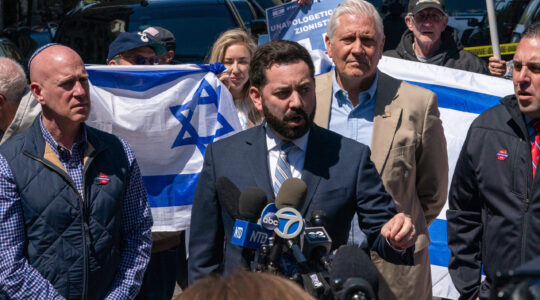WASHINGTON (JTA) — Call Herman Cain the crash-course pro-Israel candidate.
Since stumbling in May on a question about Palestinians and the right of return, the one-time pizza executive who recently rocketed to the top of GOP presidential polls has visited Israel and read up about the Jewish state.
“Mr. Cain is a firm supporter of Israel,” said Imri Eisner, who was just named Cain’s point man for Jewish outreach. “He’s made it well known that as president, he will know who our friends are and who our enemies are.”
Cain, 65, who made his professional reputation turning around the Godfather’s Pizza chain and later headed the National Restaurant Association, a national lobbying group, has embraced his outsider status among the battery of candidates hoping to challenge President Obama next year.
Speaking off the record, a number of the Republican Party’s establishment Jewish figures say they were barely aware of him before his candidacy. Eisner, a New York lawyer who was active in the 2008 presidential campaign of U.S. Sen. John McCain (R-Ariz.) and has lived in Israel, said he is readying a list of Jewish endorsements and surrogates but that it was too soon to name them.
Washington Post blogger Jennifer Rubin, a prominent Jewish conservative who backs Mitt Romney, recently fired a broadside against what she described as Cain’s equivocating answers to questions arising from sexual harassment settlements at the restaurant association.
“The correct question for voters to be asking is whether Cain knows what he is doing in a presidential race,” she wrote Tuesday. “It increasingly seems clear he has no clue how to handle the press, the controversy or himself.”
The latest controversy, however, is just the latest hurdle faced by Cain this campaign — most of which he thus far has managed to surmount. He has made a series of gaffes and admissions of ignorance on various topics, yet they have not prevented him from rising to the head of the GOP pack.
Cain’s May stumble on the Palestinians’ right of return came during an interview with Fox News Channel’s Chris Wallace about the Palestinians’ aspiration of a “right of return” to Israel. Cain at first repeated the phrase twice, as a question.
When Wallace explained the Palestinians’ position on their right of return, the candidate from suburban Atlanta responded, “They should have a right to come back, if that is a decision that Israel wants to make.”
In fact, no Israeli leader would contemplate anything but the symbolic return of a small number of Palestinians; the prospect of millions of Palestinians “returning” to Israel generally instills Israelis with dread.
After the faux pas, Cain candidly admitted that he had not been familiar with the issue and said he was reading a book on Israel. The book turned out to be “Israel at Sixty: An Oral History of a Nation Reborn” written by Gerald and Deborah Strober.
The Strobers, who are professional biographers, not long before the Fox interview had approached Cain and offered to help him write that candidate staple, the campaign autobiography. The result of their collaboration, “This is Herman Cain! My Journey to the White House,” was released last month. The Strobers say that Cain over the summer also immersed himself in Alan Dershowitz oeuvre of pro-Israel books.
The Strobers, who are Jewish and live in Manhattan, suggested a trip to Israel, and in August they accompanied Cain on a four-day tour of the country, starting with an appearance at Glenn Beck’s Jerusalem rally. Cain met with Israeli political figures — most of them on the right, including Deputy Prime Minister Moshe Yaalon, Deputy Knesset Speaker Danny Danon and Jerusalem Mayor Nir Barkat.
“Herman was visibly moved as we viewed thousands of years of Jewish history in the tunnels under the Old City,” Danon said in a statement to JTA. “He showed a keen understanding both of Jewish history as well as of the many complex challenges facing the modern State of Israel.”
Cain also spoke to opposition leader Tzipi Livni and scheduled a meeting with Palestinian Authority Prime Minister Salam Fayyad, which fell through because of scheduling conflicts. Cain made stops at Christian holy sites — Cain is a Baptist — and visited the Western Wall.
“He saw this in two lights: as a fact-finding trip and as a spiritual journey,” Gerald Strober told JTA. Since the trip, Strober said, “his learning curve is going up.”
Deborah Strober added, “He’s been briefed on the right of return and has an understanding of that.”
The couple said the emotional high point of the journey came at the end, when Cain laid a wreath at Yad Vashem, Israel’s national Holocaust memorial. Another memorable moment was when he was blessed by Rabbi Shmuel Rabinowitz, the rabbi of the Western Wall.
By the time Cain convened the requisite King David Hotel news conference before leaving Israel, he was well versed in pro-Israel rhetoric, often with a decidedly hawkish tint.
“This may get me in trouble, but I do not care,” he said. “I think the Israeli people is more interested in peace than the Palestinians. Look at history and the fact that you’re getting bombed on the southern border. It is clear to me that Israel is more interested in peace than those seeking to deny the peace process.”
In an October interview with Israel Hayom, a right-wing Israeli daily, Cain responded to a question about the Obama administration’s Israel policy by repeating three times — with slight variation of phrasing — the accusation that President Obama “threw Israel under the bus.” He also made reference to the “so-called Palestinian people,” echoing right-wing supporters of Israel who contest the authenticity of Palestinian national identity.
His campaign website doesn’t offer too many details about Israeli policy beyond emphasizing what the candidate refers to as his “Cain doctrine”: “We must stand by our friends and we must not be fooled by our enemies. We should never be deceived by terrorists. They only have one objective, namely, to kill all of us. We must always remain vigilant in dealing with adversaries.”
However, Cain’s chief proxy, J.D. Gordon, a former senior spokesman at the Pentagon, outlined broader and more detailed policy positions, particularly on Iran. Gordon told JTA that Cain would “choke” Iran economically by instituting energy measures that would force down the price of a barrel of oil and that he would float ballistic missile-capable ships off Iran’s coast as a deterrent.
Gordon, who spent time in Haifa during his military service and has a Jewish father, said he briefs Cain on foreign policy issues of the day, often with one-page briefing papers.
“He likes to get the background and discusses it so he’s ready for media questions,” Gordon said.
Cain’s backers say their candidate is a fast learner who will pick up foreign policy fast enough and is a smart enough CEO to know which advisers to pick and heed.
“He understand objectives, a strong robust national defense, to understand who our allies are and to stand with them regardless of whims of international public opinion, as with Israel,” said Josh McKoon, a Georgia state senator who has known Cain for eight years.
Another Georgia-based backer, Ron Wallace, a retired UPS executive, said that Cain was an astute listener.
“The way he thinks and strategizes, there will be a situation or problem, he’ll depend on the people who are knowledgeable and make a decision based on the facts,” Wallace said.
JTA has documented Jewish history in real-time for over a century. Keep our journalism strong by joining us in supporting independent, award-winning reporting.





